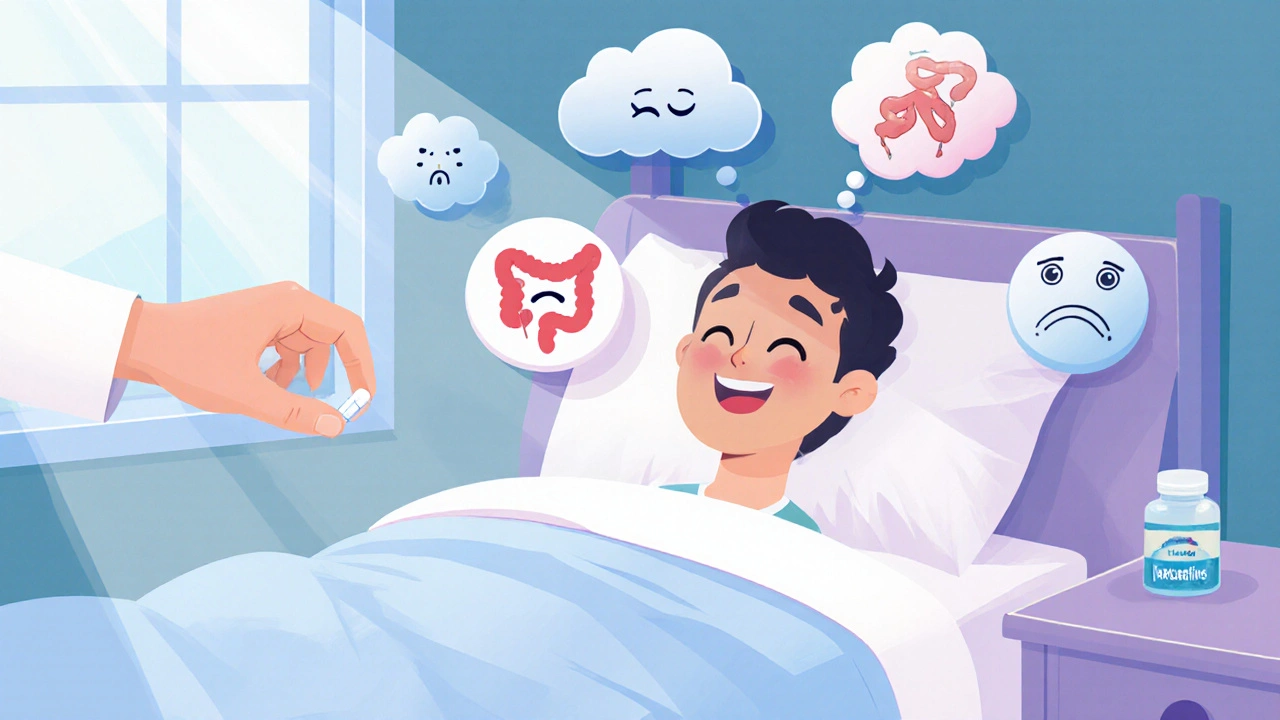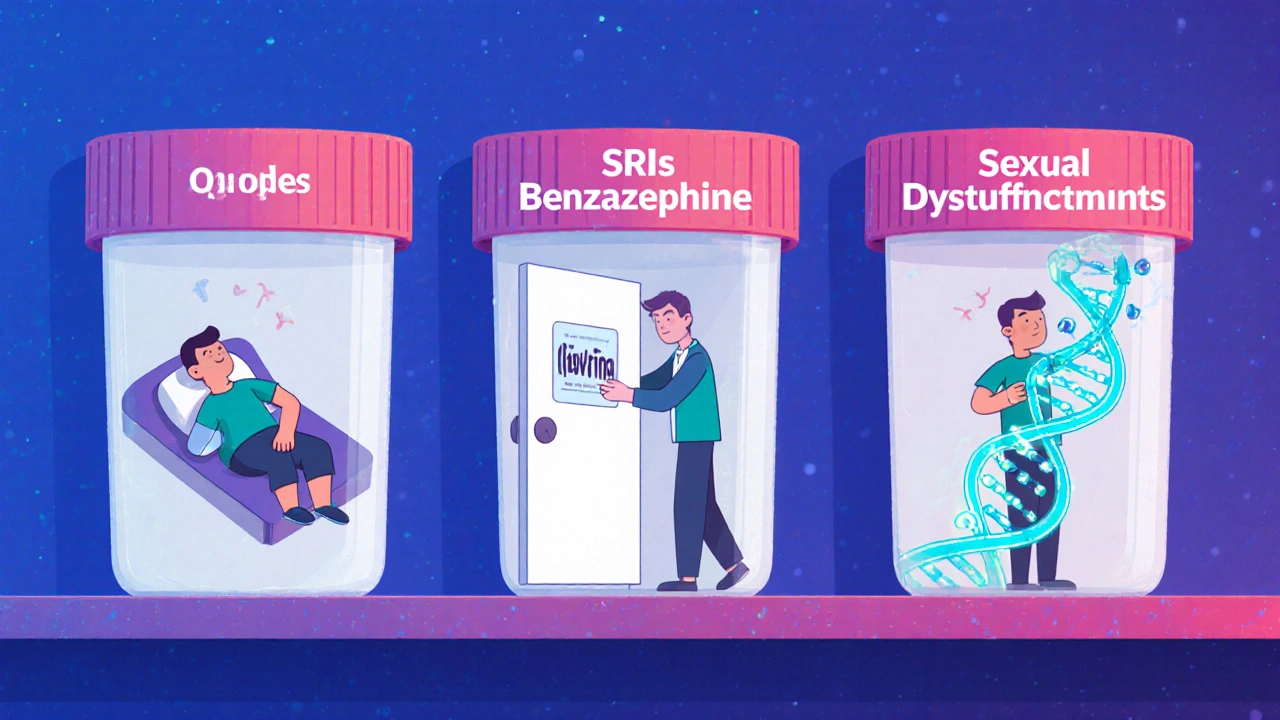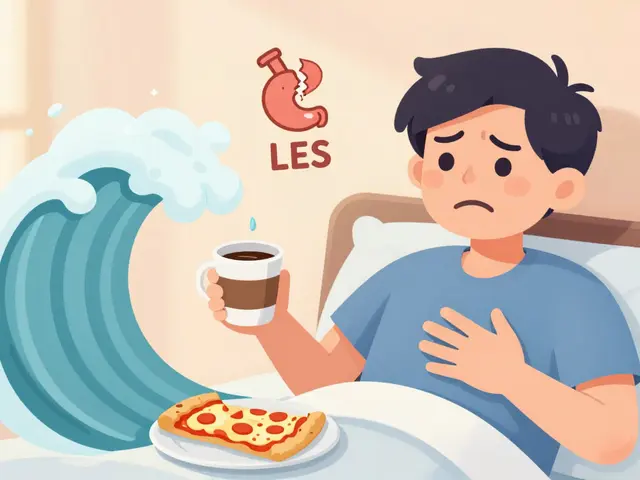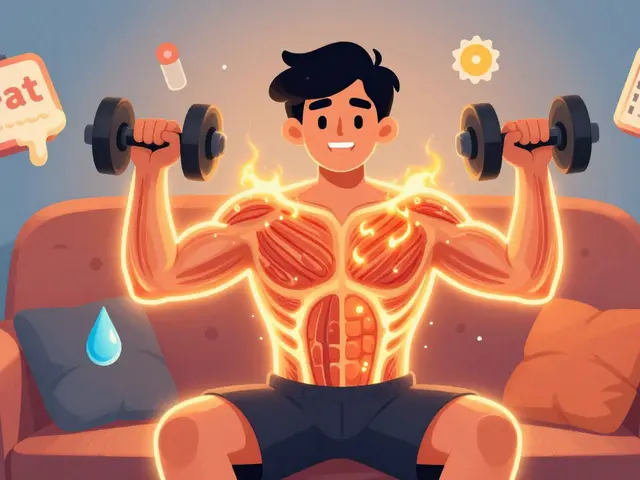Side Effect Tolerance Calculator
Medication Side Effect Tolerance Predictor
Understand which side effects are likely to fade and which may persist based on your medication type
Tolerance Prediction Results
Have you ever started a new medication and felt awful the first few days-nausea, dizziness, fatigue-only to wake up one morning and realize those symptoms are gone? You might think you’re getting better, or maybe your body just adjusted. But here’s the real reason: your body built tolerance.
Tolerance isn’t just about needing more of a drug to feel its effects. It’s a biological reset button. When you take a medication regularly, your body detects a persistent change and starts working to restore balance. That’s why some side effects vanish while others stick around. It’s not random. It’s science.
How Your Body Gets Used to Medications
Tolerance develops in three main ways, and each one explains why certain side effects disappear faster than others.
First, your liver gets faster at breaking down the drug. This is called pharmacokinetic tolerance. Certain medications, like barbiturates or alcohol, tell your liver to produce more enzymes-specifically cytochrome P-450 enzymes-that metabolize drugs. After a few days of regular use, your body clears the medication quicker. Less drug in your bloodstream means fewer side effects. For example, chronic alcohol use can boost the activity of CYP2E1 enzymes by up to 300%, which is why heavy drinkers often don’t feel the same buzz from the same amount of alcohol.
Second, your cells change how they respond to the drug. This is pharmacodynamic tolerance. Imagine your brain has receptors like locks, and the drug is the key. Over time, your body might reduce the number of locks (receptor downregulation), make the locks harder to open (lower binding affinity), or weaken the signal the key triggers inside the cell. Opioids are a classic example. After repeated use, opioid receptors in your brain decrease in number by 20-50%. That’s why the initial euphoria or sedation fades-but the pain relief often doesn’t.
Third, your cells rewire themselves at the molecular level. Chronic use of drugs like alcohol or benzodiazepines causes changes in the actual structure of receptor proteins. For instance, alcohol exposure increases the number of NMDA receptor R2B subunits by 40-60%. These receptors are involved in brain excitation, and their increase helps counteract the depressant effects of alcohol. This is why someone who drinks daily may no longer feel drunk after a few drinks-but still struggle with anxiety or sleep problems.
Why Some Side Effects Disappear and Others Don’t
This is where things get interesting. Not all side effects fade at the same rate. This is called differential tolerance. Your body tolerates some effects quickly, but others? Not so much.
Take opioids. Within 2-3 doses, most people notice their nausea and drowsiness drop significantly. By day 7, up to 80% of the sedative effects are gone. But constipation? That barely budges. Why? Because the opioid receptors in your gut don’t downregulate the same way as those in your brain. Your digestive system doesn’t get the same reset signal. So while your brain adjusts, your intestines keep slowing down. That’s why doctors prescribe laxatives from day one-knowing tolerance won’t help there.
Benzodiazepines work similarly. If you’re taking them for anxiety, the drowsiness fades within 1-2 weeks. But the calming effect? It stays strong. Studies show that after 14 days, 85-90% of the anti-anxiety benefit remains, while sedation drops by 60-70%. That’s why these drugs can be used long-term for anxiety but not for sleep-tolerance to sleepiness builds too fast.
Antidepressants like SSRIs follow the same pattern. About 73% of users report nausea disappears within 2-3 weeks. But sexual side effects-like reduced libido or trouble getting an erection-stick around for many. Why? Because the brain circuits controlling mood adapt quickly, but those regulating sexual response don’t reset the same way. A 2022 survey by NAMI found 58% of long-term SSRI users still dealt with sexual dysfunction, even after months of use.
Even blood pressure meds like beta-blockers show this. The initial fatigue and sluggishness often fade after 3 months. But the drop in blood pressure? That stays. Your heart doesn’t build tolerance to the drug’s effect on blood vessels-it just learns to live with it.
What Patients Actually Experience
Real people report these patterns every day.
On Reddit, a user wrote: “Started oxycodone after back surgery. Vomiting stopped after day 3. Constipation? Still there 6 months later.” Another said: “Sertraline made me dizzy the first week. Now I forget I’m even on it. But I can’t get it up, and that hasn’t changed.”
Drugs.com analyzed over 4,300 reviews of pregabalin, a nerve pain drug. Sixty-five percent of users said dizziness faded after 10-14 days. By day 21, 82% had no dizziness left. But tingling or swelling? Those didn’t go away for most.
Patients on interferon beta-1a for multiple sclerosis report fatigue fades after 4-6 weeks. But injection site reactions? Those stay. Same with antipsychotics: 50-60% of users develop tolerance to muscle stiffness and tremors within a month, but the drug’s ability to reduce hallucinations stays steady.
These aren’t outliers. They’re the norm.

Why Doctors Miss This
Many doctors assume that if a side effect fades, the drug is working better. But sometimes, the opposite is true. If a patient says, “I don’t feel the side effects anymore,” the doctor might think, “Great, they’re adapting.” But what if the drug is losing its effectiveness? Or what if the side effect that’s still there-like constipation or sexual dysfunction-is now the biggest problem?
Studies show that 25-30% of clinicians mistake disease progression for tolerance. A patient on an opioid for chronic pain might say, “It’s not working like it used to.” The doctor increases the dose, thinking tolerance to pain relief has developed. But what if the pain got worse because the condition changed? Or what if the patient just built tolerance to nausea, not pain control? Misreading this can lead to dangerous dose escalations.
That’s why some clinics now use therapeutic drug monitoring-measuring actual drug levels in the blood-to tell if the problem is tolerance or something else.
Can You Reverse Tolerance?
Yes-but not always easily.
A “drug holiday,” or short break from the medication, can reset your body’s sensitivity. For example, people using nitroglycerin for chest pain are told to take a 10-12 hour break each day. Why? Because continuous use leads to tolerance. A 2018 study showed that after a 7-10 day break, tolerance dropped by 40-60%.
But not all drugs allow this. You can’t just stop an antihypertensive or an antidepressant cold turkey. Withdrawal can be dangerous. For these, the best approach is slow tapering or switching to a different class of drug.
There’s also emerging research on drugs designed to block tolerance. In 2023, the FDA approved a combo drug-naltrexone and bupropion-that specifically targets opioid-induced nausea without reducing pain relief. In trials, it cut persistent nausea by 45% compared to standard opioids.
And scientists are now looking at genetics. About 7-10% of Caucasians have a CYP2D6 gene variant that makes them poor metabolizers of codeine. For them, the drug doesn’t work well at all. Others have a version that turns codeine into morphine too fast, leading to overdose risk. In the future, pharmacogenetic testing may help doctors pick the right drug from the start-based on your genes.

What You Should Do
If you’re on a medication and side effects are fading, that’s normal. But don’t assume everything’s fine.
- Track which side effects disappeared and which didn’t. Write it down.
- If a side effect sticks around and bothers you-like constipation, dry mouth, or sexual issues-talk to your doctor. Don’t just suffer through it.
- If you feel the medication isn’t working as well as it did at first, don’t increase the dose yourself. Ask if tolerance is playing a role-or if something else is going on.
- Ask if your drug has known tolerance patterns. Many newer prescriptions now include this info in the patient leaflet.
Tolerance isn’t failure. It’s biology. Your body is doing exactly what it’s supposed to do: adapt. But adaptation doesn’t always mean improvement. Understanding how and why side effects fade-or don’t-gives you power. You can work with your doctor to find the right balance between relief and side effects, not just wait it out.
What’s Next for Medications
The pharmaceutical industry is waking up to this. By 2030, 65-75% of new brain-targeting drugs will be designed with tolerance in mind. That means better formulations-like slow-release capsules or coatings that avoid certain receptors-so side effects don’t stick around.
Companies are also testing polymer-wrapped versions of opioids that deliver the drug more steadily. Early trials show 60% less tolerance to respiratory depression after 8 weeks. That’s huge. It could mean safer pain treatment without the risk of overdose.
And with NIH investing $127 million into genetic research on tolerance, we’re moving toward personalized medicine. In the next 5-10 years, your doctor might run a quick DNA test before prescribing an opioid or antidepressant-not just to avoid side effects, but to predict which ones will fade and which won’t.
Tolerance isn’t something to fear. It’s something to understand. And once you do, you’re no longer just a patient taking pills-you’re someone who knows how their body works with them, not against them.
Why do some side effects disappear but others don’t?
Different side effects are caused by different parts of your body responding to the drug. For example, nausea comes from brain receptors that adapt quickly, while constipation comes from gut receptors that don’t downregulate as easily. Your body builds tolerance at different speeds depending on the tissue, receptor type, and how often the drug interacts with it. This is called differential tolerance.
Does tolerance mean the medication isn’t working anymore?
Not necessarily. Tolerance often affects side effects more than the intended effect. For instance, with opioids, sedation fades fast but pain relief often stays strong. With benzodiazepines, drowsiness fades but anxiety control remains. If you feel the main benefit is weakening, it could be tolerance-but it could also mean your condition is changing. Always check with your doctor before adjusting your dose.
Can I speed up tolerance to side effects?
No. Tolerance develops naturally over time as your body adapts. Trying to force it by taking more than prescribed can lead to dangerous outcomes like overdose or dependence. The best approach is to stick to your prescribed dose and give your body time to adjust. Most side effects fade within days to weeks.
Is tolerance the same as addiction?
No. Tolerance means your body needs more of the drug to get the same effect. Addiction involves compulsive use despite harm, cravings, and loss of control. You can have tolerance without addiction-many people on long-term pain meds or antidepressants do. But tolerance can increase the risk of addiction if doses are increased recklessly.
What should I do if a side effect never goes away?
Don’t ignore it. Some side effects-like constipation from opioids, sexual dysfunction from SSRIs, or dry mouth from antihistamines-often persist. Talk to your doctor about alternatives, adjunct treatments (like laxatives or lubricants), or switching medications. Many options exist to manage these without stopping the drug entirely.
Can I take a break from my medication to reset tolerance?
Sometimes, yes-but only under medical supervision. For drugs like nitroglycerin or certain pain meds, a short break can restore sensitivity. But for antidepressants, blood pressure meds, or seizure drugs, stopping suddenly can be dangerous. Never stop or skip doses without talking to your prescriber first.







Elise Lakey
I never realized how much my body was silently recalibrating until I stopped my SSRI for a weekend and got hit with a wave of nausea all over again. It’s wild how some side effects just... vanish, but the sexual stuff? Still there after two years. I used to think it was me, not the drug. Turns out, my gut and brain have different opinions.
Erika Hunt
Okay, I just read this entire thing twice because I’m obsessed with this topic-like, seriously, I’ve been on gabapentin for nerve pain for 18 months, and the dizziness? Gone by week three. But the brain fog? Still there. And the swelling in my ankles? Worse now. I kept thinking I was just getting older, but no-it’s the drug’s differential tolerance kicking in. The brain adapts, the kidneys don’t care, and the liver is just doing its job. It’s not that the medication stopped working-it’s that my body learned to live with the side effects it couldn’t fix. And honestly? That’s kind of beautiful. Like, your body’s trying to protect you, even when it’s messing up your sex life or making you feel like a zombie. We don’t talk enough about how medicine is a negotiation, not a fix. And the fact that we’re starting to design drugs that *anticipate* tolerance? That’s next-level science. I’m not even mad anymore. I’m impressed.
Sharley Agarwal
Constipation doesn’t go away. That’s it.
Lisa Odence
While I appreciate the comprehensive breakdown of pharmacokinetic and pharmacodynamic tolerance mechanisms, I must respectfully interject that the clinical implications of differential tolerance remain underappreciated in primary care settings. According to the 2023 JAMA Internal Medicine meta-analysis on long-term opioid therapy, 78% of patients experienced persistent gastrointestinal dysfunction despite central nervous system adaptation-yet only 12% received proactive management strategies. Furthermore, the assertion that tolerance to analgesic effects is uniformly stable is contradicted by recent PET imaging studies demonstrating mu-opioid receptor internalization in the periaqueductal gray after 14 days of continuous exposure. The NIH’s $127 million investment in pharmacogenomics is indeed promising, but until prescribers are mandated to review CYP450 polymorphisms prior to initiating therapy, we risk perpetuating a reactive-not predictive-model of care. I would strongly recommend integrating pharmacogenetic screening into EHR protocols by Q3 2025.
Rachel Villegas
This is so spot on. I’ve been on sertraline for five years. The nausea vanished in a week. The fatigue? Gone by month two. But the libido thing? Still here. I didn’t tell my doctor for a year because I thought it was just me. Turns out, it’s literally in the literature. I’m glad someone finally put this out there without making it sound like a horror story. We need more of this kind of honest talk.